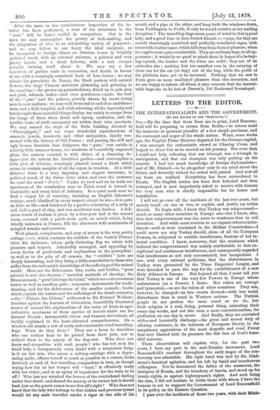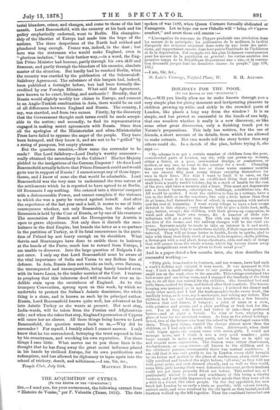LETTERS TO THE EDITOR.
THE INTERNATIONALISTS AND THE GOVERNMENT. [TO THE EDITOR OF THE "SPECTATOR.") SIR,—By the time that these lines are in print, Lord Beacons- field will be preparing to return from Berlin,—to return amid the insincere or ignorant plaudits of a few simple partisans, and the contempt and anger of the whole nation. When, some weeks ago, the English Prime Minister departed for the German capital, I was amongst the enthusiastic crowd at Charing Cross, and helped to cheer him as he started on his journey. But even then I could not help reflecting that our triumph was a triumph in anticipation, and that our champion was only putting on his armour. I had too much knowledge of foreign diplomatists— and of Mr. Disraeli—to be altogether easy in my mind about the future, and devoutly wished the ordeal well passed. And now all my fears are realised. Everything has been surrendered to Russia. The English nation has been first befooled and then betrayed, and is now impudently asked to receive with honour the very man who is chiefly responsible for its losses and humiliation.
I will not go over all the incidents of the last two years, but merely touch on one or two, to explain and justify my action• therein. To begin with, I knew that Turkey was misgoverned— much as many other countries in Europe are—but I knew, also, that that misgovernment was due more to weakness than to evil intention. And while most anxious to see organic reforms intro- duced—such as were contained in the Midhat Constitution—I could never see why Turkey should, alone of all the European Powers, be subjected to outside interference, because of her in- ternal condition. I knew, moreover, that the weakness which induced the misgovernment was mainly attributable to that ex- ceptional and continuous interference, and consequently regarded that interference as not only unwarranted, but inexpedient. I saw, with every rational politician, that the disturbances in Turkey were promoted by the Three Emperors' League, and were intended to pave the way for the establishment of a new Holy Alliance in Europe. But beyond all that, I must tell you that Turkey is one of the very few Powers in Europe whose maintenance (as a Power) 1 desire. Her rulers are corrupt and tyrannical,—so are the rulers of other countries. They can, however, be changed—as late events showed—with less social disturbance than is usual in Western nations. The Turkish people do not profess the same creed as we do, but their religion is a real, living, personal thing, animating their every-day works, and not like ours, a mere conventionalism, for profession on one day in seven. And finally, they are entrusted with—and heroically discharge—the great and sacred duty of offering resistance, in the interests of European liberty, to the- sanguinary aggressions of the most despotic and cruel Power that ever blasted with its presence the fair face of God's beau- tiful universe.
These observations will explain why, for the past two years, I bore my part in the anti-Russian movement. Lord Beaconsfield's conduct throughout the early stages of the con- troversy was admirable. His right hand was tied by Mr. Glad- stone's fanatical agitation, and his left by timid and treacherous colleagues. Yet he denounced the fables of the massacres, the intrigues of Russia, and the treachery of Servia, and stood up for treaty-rights, as against highwaymen's rights. And such being the case, I did not hesitate to invite those with whom I have the honour to act to support the Government of Lord Beaconsfield in its policy on the Eastern Question. I pass over the incidents of those two years, with their Mink- terial blunders, crises, and changes, and come to those of the last month. Lord Beaconsfield, with the country at his back and his policy emphatically endorsed, went to Berlin. His champion- ship of the liberties of Europe had made him the hope of the nations. The three despotisms of the North had robbed and plundered long enough. France was, indeed, in the dust ; but here was the statesman who would make England, even in "glorious isolation," bar their farther way,—in a word, the Eng- lish Prime Minister had become, partly through his own skill and firmness, and partly through the blunders of his enemies, absolute master of the situation. But hardly had he reached Berlin, when the country was startled by the publication of the Schouvaloff- Salisbury Agreement. The substance of this bargain had, indeed, been published a fortnight before, but had been formally dill- -credited by our Foreign Minister. What said that Agreement, now known to be exact, binding, and authentic ? Broadly, that if Russia would slightly modify her claims in Europe, and consent to an Anglo-Turkish combination in Asia, there would be an end of all differences between England and Russia. The country, I say, was startled, and from two causes. Firstly, by the discovery that the Government thought such terms could be made accept- able to the nation; and secondly, to find its representatives engaged in making secret agreements with Russia. Since then all the apologies of the Ministerialist and ultra-Ministerialist Press have failed to appease the anger of the people. They have been betrayed, and they know it, and are not to be " gulled" by a string of pompous, but empty phrases.
But the question remains,—How came the surrender to be made? Has Lord Salisbury—Lord Derby's worthy successor— really obtained the ascendancy in the Cabinet? Has her Majesty yielded to the instigations of the German Emperor ? Or does Lord Beaconsfield actually believe that Prince Bismarck could and would go to war in support of Russia? I cannot accept any of these hypo- theses, and I know of none else that would be admissible. Lord Beaconsfield was the very man to understand the true nature of the settlements which he is reported to have agreed to at Berlin. Of Roumania I say nothing. She entered into a thieves' compact with a dishonourable Power, and cannot complain if the violence to which she was a party be turned against herself. And after the experience of the last year and a half, it seems to me of little consequence whether, not only Bessarabia, but the whole of Roumania is held by the Czar of Russia, or by one of his creatures. The annexation of Bosnia and the Herzegovina by Austria is open to grave objections. Not only does it disturb the race- balance in the dual Empire, but brands the latter as a co-partner in the partition of Turkey, as if its fatal concurrence in the parti- tion of Poland lay not heavy enough on its shoulders. What Servia and Montenegro have done to entitle them to leniency at the hands of the Porte, much less to reward from Europe, I am unable to discover. Into the large question of Bulgaria I do not enter. I only say that Lord Beaconsfield must be aware of the vital importance of Sofia and Varna to any Balkan line of defence. In Asia, Russia does not recede an inch, even Batoum, the unconquered and unconquerable, being basely handed over, with its brave Lazes, to the tender mercies of the Czar. I venture to prophesy that this infamous deed will remain for ever an in- delible stain upon the escutcheon of England. As to this trumpery Convention, sprung upon us this week, by which we undertake to protect the Sultan's Asiatic dominions, the whole thing is a sham, and is known as such by its principal author. Russia, Lord Beaconsfield knows quite well, has advanced as far into Asiatic Turkey as she wants at present. Her next step, India-wards, will be taken from the Persian and Affghanistan side ; and when she takes that step, England's possession of Cyprus will cause her no alarms. All these things being known to Lord Beaconsfield, the question comes back to us,—Why did he surrender? For myself, 1 frankly admit I cannot answer. 1 only know that he has surrendered, betraying the trust reposed in him by his countrymen, and wrecking his own reputation. For these things I care little. What moves me to pen these lines is the thought that he has flung away the great moral influence placed in his hands by civilised Europe, for its own purification and redemption, and has allowed its diplomacy to lapse again into the school of trickery, deceit, and selfishness.—I am, Sir, &c.,



































 Previous page
Previous page